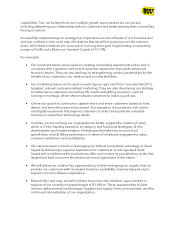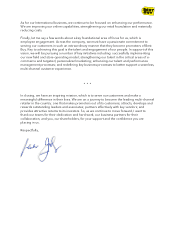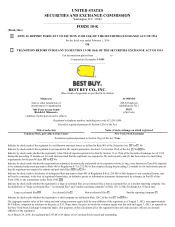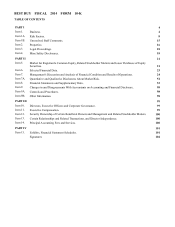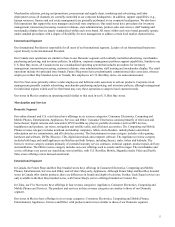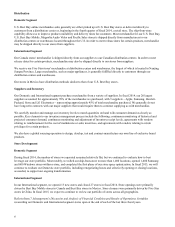Best Buy 2014 Annual Report Download - page 14
Download and view the complete annual report
Please find page 14 of the 2014 Best Buy annual report below. You can navigate through the pages in the report by either clicking on the pages listed below, or by using the keyword search tool below to find specific information within the annual report.9
Failure to anticipate and respond to changing consumer preferences in a timely manner could result in a decline in our
sales.
Our success depends on our vendors' and our ability to successfully introduce new products, services and technologies to
consumers. The level of success we achieve is dependent on, among other factors, the frequency of product and service
innovations, how accurately we predict consumer preferences, the level of consumer demand, the availability of merchandise,
the related impact on the demand for existing products and the competitive environment. Consumers continue to have a wide
variety of choices in terms of how and where they purchase the products and services we sell. Failure to accurately predict and
adapt to constantly changing technology and consumer preferences, spending patterns and other lifestyle decisions, could have
a material adverse effect on our revenues and results of operations.
Sustained or worsening economic pressures in the U.S. and key international markets could adversely affect consumer
spending and our financial results.
For the past several years, we have experienced the impact of difficult and uncertain macroeconomic conditions in the
geographic markets in which we operate. Some of our products and services are viewed by some consumers to be discretionary
items rather than necessities. As a result, our results of operations are sensitive to changes in macroeconomic conditions that
impact consumer spending. Consumer confidence, employment levels, interest rates, tax rates, availability of consumer
financing, housing market conditions, and costs for items such as fuel, energy and food, can adversely affect consumers'
demand for the products and services that we offer. Our future results could be significantly adversely impacted by these
factors.
If we fail to attract, develop and retain qualified employees, including employees in key positions, our business and
operating results may be harmed.
Our performance is highly dependent on attracting and retaining qualified employees, including our senior management team
and other key employees. Our strategy of offering high quality services and assistance for our customers requires a highly
trained and engaged workforce. The turnover rate in the retail industry is relatively high, and there is an ongoing need to recruit
and train new store employees. Factors that affect our ability to maintain sufficient numbers of qualified employees include
employee morale, our reputation, unemployment rates, competition from other employers and our ability to offer appropriate
compensation packages. Our inability to recruit a sufficient number of qualified individuals or failure to retain key employees
in the future may impair our efficiency and effectiveness and our ability to pursue growth opportunities. In addition, we have
experienced a significant amount of turnover of senior management employees with specific knowledge relating to us, our
operations and our industry, which turnover may negatively impact our operations.
Consumer demand for the products and services we sell could decline if we fail to maintain positive brand perception
and recognition.
We operate a global portfolio of brands with a commitment to customer service and innovation. We believe that recognition and
the reputation of our brands are key to our success. The proliferation of web-based social media means that consumer feedback
and other information about our company are shared with a broad audience in a manner that is easily accessible and rapidly
disseminated. Damage to the perception or reputation of our brands could result in declines in customer loyalty, lower
employee retention and productivity, vendor relationship issues, and other factors, all of which could materially affect our
profitability.
Our success is dependent on the design and execution of appropriate business strategies.
Our success is dependent on our ability to identify, develop and execute appropriate strategies. Our current strategy includes
transformational change to many areas of our business, including our online and in-store customer experience, expanding our
distribution system by shipping to customers from our stores, employee training and engagement, partnership with our vendors,
retail execution and cost control. Achieving the goals we have set in a timely manner will be challenging, and it is possible that
our strategies may prove to be ineffective and that we may need to make substantial changes to them in future periods. It is also
possible that we will be unsuccessful in executing our strategies, that the strategies we will implement expose us to additional
risks or that strategies that have been successful in the past will fail to produce the desired results. Our results could be
materially adversely affected if we fail to design and execute appropriate strategies. The market value of our common stock and
debt instruments could be materially adversely affected if investors are uncertain about the appropriateness of our strategies or
our ability to execute them.


